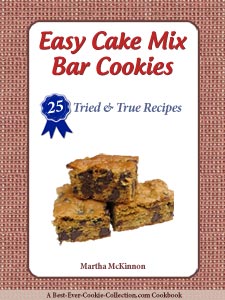Ask The Cookie Doctor - Cookie FAQs
Your Answers to Common Cookie Making Questions
- How can I prevent my cookies from sticking to my cookie sheet?
- How do I prevent my cookies from burning on the bottom?
- Why are my chocolate chip cookies so inconsistent, even when I use the same recipe? Sometimes they turn out soft and chewy; other times they are flat and crisp!
- How can I prevent my cookies from drying out so quickly
- Can olive oil be used in baking cookies?
- How can I prevent my crisp cookies from going soft and limp?
- My cookies often turn out hard and overdone. Help!
- The recipe says drop by rounded teaspoon or tablespoon. Just how much dough is that?
- What purpose does brown sugar have in baking cookies?
- What flour is best for baking cookies?
- Why do you need salt when baking cookies?
- Can I freeze my cookies?
- What kinds of cookies are best for shipping?
- How do I pack cookies for shipping?
- Many cookie recipes call for toasted nuts, why?
- What is the best way to toast nuts?
- Help, my cookie dough dry and crumbly. How can I correct it?
- My cookie dough turned out too soft and sticky. How can I fix it?
- Why do my cookies bake togther on my cookie sheet?
- Why are my second and third sheets of cookies spreading out more than my first sheet?
- What's causing my cookies to turn out very thin and flat?
- Why do my cookies turn out hard and dry after baking?
- Why are my cookies coming out crisp and then becoming soft?
- What makes my soft cookies become crisp or hard?
- Why are my cookie bars crumbling when I cut them?
- Why do my bar cookies turn out dry and hard?
- Some cookie recipes call for flaked coconut and others shredded. What's the difference?
- What is turbinado sugar?
- How can I prevent my cookies from sticking to my cookie sheet?
Line your baking sheets with either parchment paper, Reynolds non-stick foil, or silicon liners. - How do I prevent my cookies from burning on the bottom?
Any of the following can cause your cookies to burn: flimsy or thin cookie sheets, dark color cookie sheets, or baking your cookies too close to the oven's bottom heating element. For best results, invest in light colored, heavy duty cookie sheets and bake your cookies on a rack placed in the center of the oven. Some bakers prefer insulated cookie sheets since they provide extra protection against burnt cookie bottoms. - Why are my chocolate chip cookies so inconsistent, even when I use the same recipe? Sometimes they turn out soft and chewy; other times they are flat and crisp!
There are many variables that can effect the consistency of your cookie dough and resulting cookies. The amount of protein in your flour can vary significantly from kind and brand. The higher the protein content the thicker your cookies will be. Another variable is the amount of flour. It is important to be consistent and as exact as possible when measuring out flour since depending on how you scoop the flour can vary the amount in each cup. That is why professional bakers use scales, not measuring cups for baking. The more flour in your cookie dough, the thicker and chewier your cookies will be. Check our our Common Cookie Fixes for steps you can take to help insure you get the style of cookies you desire. - How can I prevent my cookies from drying out so quickly?
Be sure to store each type cookie in airtight containers, separate from each other. To keep soft or chewy cookies moist, add a piece of an apple to the container. The cookies will draw the moisture from the apple and stay moist longer. - Can olive oil be used in baking cookies?
Yes, olive oil can be used in baking cookies, but it will change the cookies' texture making them crispy on the outside with a more cakey interior. Although cookies made with olive oil are good, they won't be as tender as cookies made with butter. It is also best to use a light, less intense extra virgin olive oil that won't interfere with the cookie's flavor. - How can I prevent my crisp cookies from going soft and limp?
For the crispest cookies be sure to use white sugar. Brown sugar, molasses, and honey will absorb water from the air making your cookies soft. - My cookies often turn out hard and overdone. Help!
First, be sure that your oven temperature is accurate by investing in an oven thermometer. Because cookies are so small and have such a short baking time they need to be watched closely. Check them at the earliest time range suggested in your recipe. Remove them when the edges just begin to turn golden brown. Don't wait for the tops to be brown. The cookies will continue to cook for a few minutes on the cookie sheet once removed from the oven so if you wait too long they will be overdone once cooled. - The recipe says drop by rounded teaspoon or tablespoon. Just how much dough is that?
A rounded teaspoon should be about 1 3/4 teaspoons of dough; a rounded tablespoon should be about 1 1/2 tablespoons. Various size cookie scoops are available to make scooping and dropping cookie dough much easier. - What purpose does brown sugar have in baking cookies?
Brown sugar is white granulated sugar with added molasses. There are two common types of brown sugar: light brown sugar (less molasses) and dark brown sugar (more molasses). The purpose of brown sugar in baking cookies is to provide sweetness, color, flavor, and tenderness. Brown sugar provides more liquid than granulated sugar and will result in a softer, chewier cookie. - What flour is best for baking cookies?
What flour is best for baking cookies depends on the type of cookies you want. Flours have different protein contents that will affect the amount of liquid absorbed and the texture/tenderness of your cookies. Lower protein flours will such as cake flour and bleached all-purpose flour result in more tender cookies; higher protein flours such as unbleached all-purpose flour and bread flour will produce thick and chewy cookies. I prefer King Arthur unbleached all-purpose flour for most of my homemade cookie making and baking, since I tend to prefer thicker, more chewy old-fashioned drop cookies. - Why do you need salt when baking cookies?
You need salt when baking cookies to bring out the sweetness in your cookies. Just a small amount of salt is all that is needed - usually between a pinch and a teaspoon. - Can I freeze my cookies?
Because of their high fat content, most cookies freeze well. The key is to double wrap them to protect them from breaking and/or freezer burn, first in plastic wrap, and then place them in a freezer bag or airtight container. Defrost your cookies completely before serving. They can be reheated for just a couple of minutes in a 350F degree oven to refresh them. Another alternative is to freeze cookie dough and then bake cookies as you need them so they are always at the peak of taste and freshness. I like to freeze balls of cookie dough that can baked as drop cookies and rolls of cookie dough that can be sliced and baked. Cookies and cookie dough should last in the freezer for up to a month; cookie dough for 2 to 3 months. - What kinds of cookies are best for shipping?
The best kinds of cookies for shipping are sturdy cookie jar cookies: the standards like chocolate chip, peanut butter, oatmeal, shortbread, biscotti, brownies, and sturdy bar cookies. Avoid shipping fragile or frosted cookies. - How do I pack cookies for shipping?
Cookies should be packed in airtight containers in single layers between layers of wax paper. The cookies need enough room to rest flat in the bottom of the container, without overlapping. When you get to the top of the container, create a cushion with crumbled up plastic wrap before closing the lid. Shake the container gently to make sure the cookies are not able to wiggle and jiggle around. Each type of cookie should be packed in a separate container. The containers should then be placed in a sturdy box cushioned with styrofoam peanuts, crumbled newspaper, or air-popped popping corn. Alternatively, you can wrap the the containers in bubble wrap before packing them in a sturdy box. - Many cookie recipes call for toasted nuts, why?
Toasting nuts makes them taste better. Heating the nuts natural oils brings out deeper aroma and flavor. - What is the best way to toast nuts?
Nuts can be toasted in a skillet on top of the stove or in the oven.
- To toast nuts on top of the stove:
Place the nuts in a single layer in a dry skillet over medium heat. Cook, stirring constantly until they are golden and fragrant. - To toast nuts in the oven:
Preheat oven to 350F degrees. Spread the nuts in a single layer in a rimmed baking sheet. Bake, stirring occasionally, until golden and fragrant, about 5 to 15 minutes.
Approximate Oven Toasting Time for Various Nuts:
Almonds (whole): 7 to 10 minutes
Chestnuts: 25 minutes
Hazelnuts: 12 to 15 minutes (to skin hazelnuts after toasting, let them cool for a few minutes and then pour the nuts onto a clean kitchen towel spread out on a work surface. Gather the towel around the nuts and rub together until most of the skins have come off - don't worry about getting off every bit of skin)
Macadamia Nuts: 12 to 15 minutes
Pecans: 10 to 15 minutes
Pine Nuts: 5 minutes
Walnuts: 10 to 15 minutes - To toast nuts on top of the stove:
- Help, my cookie dough dry and crumbly. How can I correct it?
You can work in 1 to 2 tablespoons of milk, water or another liquid called for in the recipe. - My cookie dough turned out too soft and sticky. How can I fix it?
You should refrigerate your dough and if it's still too soft after chilling for 2 hours, try mixing in some flour (one tablespoon at a time), just until your dough is easy to work with. - Why do my cookies bake togther on my cookie sheet?
When placing your cookie dough on your cookie sheet before baking, make sure there is at least 2 inches separating your cookies. Also, only place your dough on completely cooled cookie sheets. - Why are my second and third sheets of cookies spreading out more than my first sheet?
As you unbaked cookie dough sits out on the counter waiting to be used, it will warm up and this causes the fat to melt sooner in the oven which results in cookies that spread more. To avoid this from happening, keep your dough refrigerated between baking each sheet of cookies. - What's causing my cookies to turn out very thin and flat?
Be sure to place your cookie dough only on cool cookie sheets and don't use butter that is too soft or partially melted (if the recipe calls for softened butter. If your cookies always turn out thin and flat, you may not be using enough flour (which is most likely caused by not measuring your flour correctly). When making your next batch of cookies, add 2 additional tablespoons of flour to the dough and bake a test cookie. If it still spreads too much, add more flour (1 tablespoon at a time) to the remaining dough. Bake a test cookie each time you add another tablespoon of flour until you get the cookie you want. For your future cookie baking adventures you'll now know how much flour to add to recipes to get the desired results. You can also try chilling the dough until it's firm (but not too firm to handle) before shaping and baking. - Why do my cookies turn out hard and dry after baking?
You might be using too much flour for your recipe. Don't tap, pack or shake flour into the measuring cup, or you'll end up with too much. Instead, lightly spoon the flour into the measuring cup, and level with a straight-edged knife or spatula. - Why are my cookies coming out crisp and then becoming soft?
When you store your cookies, make sure they are loosely covered. To recrisp cookies that have become too soft, put them on a cookie sheet and heat them in a 300F degree oven for about 5 minutes. Immediately remove to a wire rack and allow cookies to cool completely. - What makes my soft cookies become crisp or hard?
Make sure that you store your cookies in a tightly covered container. To soften them, put a slice of bread in the storage container with the cookies and let it stand for a day or two. The moisture from the bread will be drawn into the cookies and they will soften. - Why are my cookie bars crumbling when I cut them?
You'll want to make sure that your pan of cookie bars is completely cool before cutting. Also, brownies and soft and sticky bars will cut better with a plastic knife. - Why do my bar cookies turn out dry and hard?
Be sure to use the exact pan size called for in the recipe. Make sure that your oven temperature isn't too hot and be sure to check for doneness at the minimum bake time given in the cookie recipe. Don't pack, tap or shake your flour into the measuring cup or you'll end up with too much flour. Instead, lightly spoon flour into measuring cup and level with a straight-edged knife or spatula. Be sure to spread your dough evenly in the pan before baking. If using a dark nonstick pan or glass baking dish, reduce the temperature of your oven by 25 degrees, or check for doneness of your cookie bars 3 to 5 minutes before the minimum bake time given in the recipe. - Some cookie recipes call for flaked coconut and others shredded. What's the difference?
Flakes are short short, flat pieces of coconut meat, while shreds are usually a bit longer and wider. Coconut flakes and shreds can be used interchangeably and both are typically sold with sweetness added. If you want and unsweetened version of coconut shreds or flakes, be sure to check the organic section of your favorite market or health food store. - What is turbinado sugar?
Turbinado sugar is a large-crystal sugar that is golden brown in color. It is often labeled as raw sugar or Demerara sugar and sometimes referred to as natural brown sugar. You can find it in most natural foods stores and in most well-stocked grocery stores. Turbinado sugar is not as processed as white sugar and therefore a favorite ingredient for many health-conscious bakers.
Back from Cookie FAQs to Making Brownies and Cookies
Back from Cookie FAQs to Best Ever Cookie Collection home





